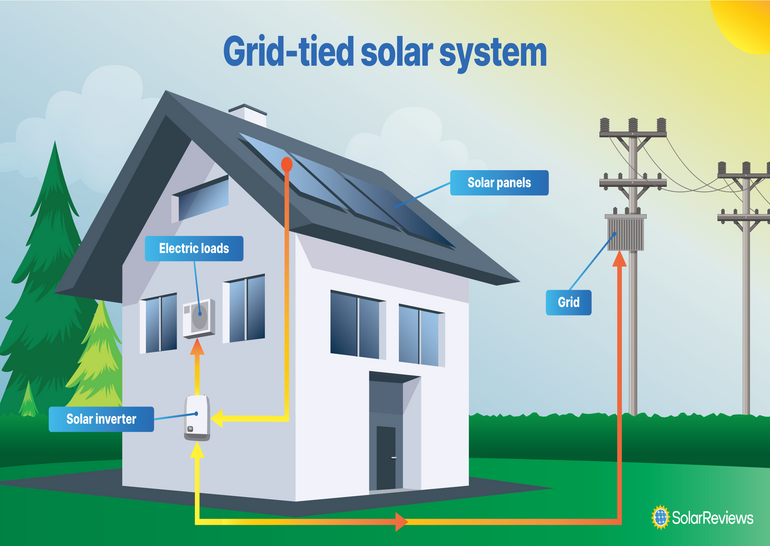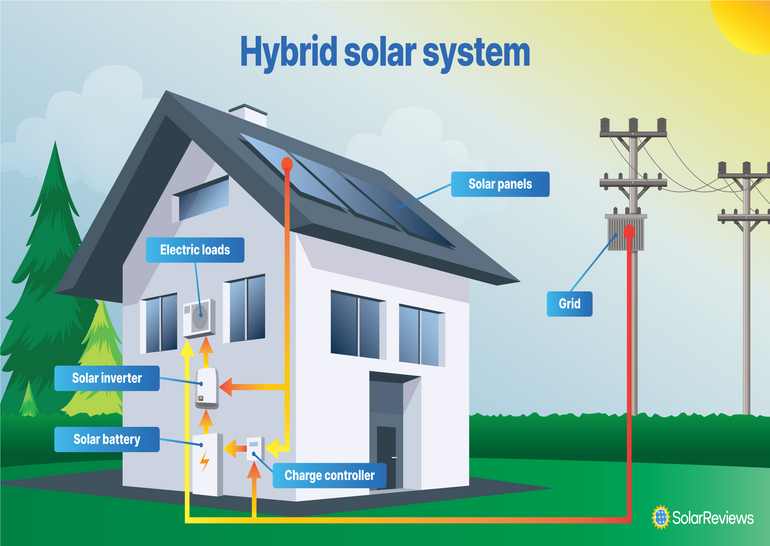Our experts are ready to help you understand how solar can work for your home. Schedule a free, no-obligation consultation to assess your energy needs and potential savings.



A Grid-tied solar solution is a solar power system that is connected directly to the utility power grid. The main function of this system is to use the electricity generated by solar panels during the day to power a home or business and send any excess electricity back to the grid. This excess electricity can be credited back to the consumer's account through a mechanism called net metering.

A Hybrid solar solution combines the features of both grid-tied and off-grid solar systems. It uses solar panels to generate electricity and includes a battery storage system to store excess energy. This stored energy can be used when solar power is not available (e.g., at night or during cloudy days) or during a grid outage.
A simple Grid-Tied system will usually be the best financial choice. Grid-tied systems generally provide the best return on investment because of their low upfront cost and simple system design.
However, there are some cases where a Hybrid system may make the most sense for you, especially if you experience regular power outages. If you really value energy independence and maximizing the amount of renewable energy your home uses, then a solar plus storage system could be just what you're looking for.
Off-Grid systems are probably the least practical for everyday homeowners. But they are excellent for remote areas and may be the practical for everyday homeowners. But they are excellent for remote areas and may be the right choice for your mountain
The best way to figure out the right solar system for you is by Contacting Us now!
System Size: Larger systems capable of generating more power generally cost more.
Type of Panels and Components: Different types of solar panels (monocrystalline, polycrystalline, or thin-film) have varying costs.
Installation Location: Roof installations may differ in cost compared to ground-mounted systems, depending on the complexity of the project.
Local Regulations and Permits: Depending on your location, additional costs may be incurred for permits or regulatory compliance.
Cloudy Days: Solar panels can still produce electricity under diffuse sunlight, though the output will be lower compared to bright, sunny conditions.
Battery Storage: Our systems can be equipped with battery storage solutions that store excess energy generated during sunny days for use during periods of low sunlight or at night.
Grid Connection: For grid-tied systems, you can continue to draw electricity from the grid during times when solar production is insufficient.
Net Metering: In many areas, you can sell the excess electricity back to the utility company through net metering, where you receive credits on your energy bill for the surplus power generated.
Battery Storage: You can store excess energy in solar batteries to use during times when your panels are not producing energy, such as at night or during power outages.
Off-Grid Systems: For those with off-grid systems, any excess energy can be stored for later use, reducing reliance on backup generators or other sources.
Our experts are ready to help you understand how solar can work for your home. Schedule a free, no-obligation consultation to assess your energy needs and potential savings.